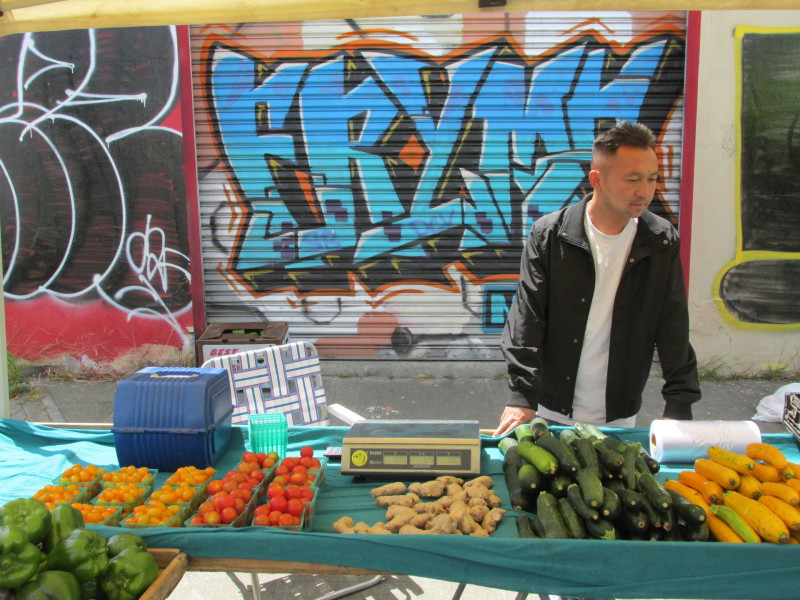"The additional funding allows us to participate with smaller markets, more regional and rural markets," says Martin Bourque, executive director at the Ecology Center. "It also allows us to work with CSAs, farmstands and the emerging mobile markets."
Phat Beets is a North Oakland food justice collective that introduced Market Match three years ago. It supports farmers of color with a variety of programs, including community supported agriculture (CSA) boxes that it distributes around the East Bay and at farmers markets.
"If you're taking and making the farmers market a little more equitable and welcoming to folks, you're increasing the traffic, the access, and you're getting more sales for your farmers." says development director Max Cadji.
The boost in funds also allows markets that couldn't previously afford the program to participate, such as San Francisco's Heart of the City market.
On a Wednesday afternoon at Heart of the City in United Nations Plaza, shoppers on public assistance line up to swipe their CalFresh electronic benefit transfer (EBT) cards, which gives them money in the form of plastic tokens to buy fruits and vegetables.
Heart of the City has the largest EBT program in California, with over $250,000 in transactions every year. The farmer-operated market has two market days a week, on Wednesdays and Sundays. In order to match all of the expected EBT transactions in the next two years, the market matches only up to $7, compared with $10 at most markets.
For many shoppers, it's their first time using Market Match. The cashiers at the information tent explain the program, as shoppers swipe their cards.
"Do you know about our Market Match program?" the cashier asks market shopper Ronald Becker.
"What’s that?" he replies.
"Market Match," the cashier says. "It’s our new program where we can match your EBT purchase up to $7 per market day. So since you spent $20, we’ll give you an extra $7."
Becker looks at his handful of tokens. He walked to the market from his home near the Civic Center. As a veteran, Becker receives CalFresh as part of his pension plan. He likes to buy fish, mushrooms and herbs.
"I like to make West African cooking," he says. "I like groundnut chops, different stews. Now I’m into a fish kick, so I’m making a lot of fish -- a lot of seafood."
At Heart of the City, market director Kate Creps oversees the conversion of cash into tokens, and back into cash for farmers.
"Market Match is blue over here," she says, as she sorts a bag full of yellow, blue and green (for debit and credit) tokens. "That's our newest token. We’ve only had it since the beginning of June."
Since launching Market Match, Creps says, Heart of the City has distributed $4,000 in tokens. That's $4,000 worth of food that people couldn't otherwise afford. Consequently, all that extra buying power helps farmers sell more of what they grow, too.
Farmer Grace Teresi grows berries, herbs, and other foods at Miramonte Farms and Nursery in San Juan Bautista. Business has been rough, she says. So those Market Match tokens are always a welcome sight,
"So yes, it’s been a great help," Teresi says. "My sales that would have been down like 20 percent have been down not as bad. It’s been down maybe 10 percent."
Demand for Market Match is so strong that the Ecology Center wants to expand, but funds are limited. The new grant, which was awarded in April, will allow the program to reach 234 sites in the next two years -- but more markets want to join today.
That's why the Ecology Center is sponsoring AB1321, a bill that provides the legal framework for the state to administer nutrition incentive programs like Market Match, to the extent that funds are available.
If the bill passes, the extra money from the state would increase the chance of a second round of funding from the federal government.
